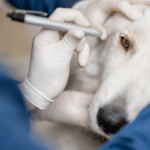De-sexing, it is one of the most talked about veterinary services available to you and your pet. We as a clinic support and recommend de–sexing for both dogs and cats. Dogs and cats reach sexual maturity at different stages in their lives for instance;
- Dogs can reach sexual maturity from 6 months of age depending on breed.
- Cats can reach sexual maturity from 4 months of age
Our vets consider a number of different factors when advising on timing of de-sexing for individual patients. In general cats can be de-sexed as early as 4 months of age and dogs can be de-sexed as young as 4-6 months of age. This can greatly reduce the risk of certain health conditions developing in your pet. For those who are not sure or want to delay the decision to you can chemically castrate male dogs with an implant and when it wears off their testosterone hormone production will return and they can be used for breeding. You can either continue to re-implant them or perform a permanent castration surgically.
Large breed dogs sometimes have de-sexing delayed to allow further growing of the skeletal structure in the hope it reduces the risk of cruciate ligament damage but studies showing this to be of benefit are not conclusive and both de-sexed and entire pets commonly get cruciate ligament damage in their knees.
The overall benefits of de-sexing your pet extend to both their physical health and behaviour. It has been shown that de-sexed pets aren’t exposed to as many health risks as those that remain entire, nor are they exposed to external factors that may harm them whilst in the search for a mate when they are entire (not de-sexed). Pets that are de-sexed also display less territorial behaviour and aggression. De-sexing alone is not going to fix these behaviours if your pet has been showing signs of these traits, however, it will make it easier to do training to teach alternative behaviours that are more acceptable.
Below is a list of health concerns seen with pets who are not de-sexed.
Female Dogs:
- Pyometra, refers to a potentially fatal infection of the uterus. Can present as either closed (non-discharging) or open (pus discharge from the vulva)
- Tumours
- Mastitis
- Unwanted behaviours – escaping, barking/vocalising, aggression
Male Dogs:
- Reproductive tumours
- Urinary and prostate issues
- Injury caused by escape attempts
- Unwanted Behaviours – escaping, barking/vocalising, territorial behaviour, aggression, Frequent urine marking.
Female Cats:
- Mammary tumours and mastitis
- Unwanted behaviours – vocalising, straying from home and destruction of property in and around the home
Male cats:
- Urinary issues
- Unwanted behaviours – Vocalising, fighting, territorial spraying, aggression, straying from the home and destruction of property in and around the home
There is no right or wrong decision about de–sexing your pets but there are some serious health risks and significantly increased Council registration fees to consider if you are not wanting to de–sex them.
Call the clinic to discuss the individual needs of your pet.






